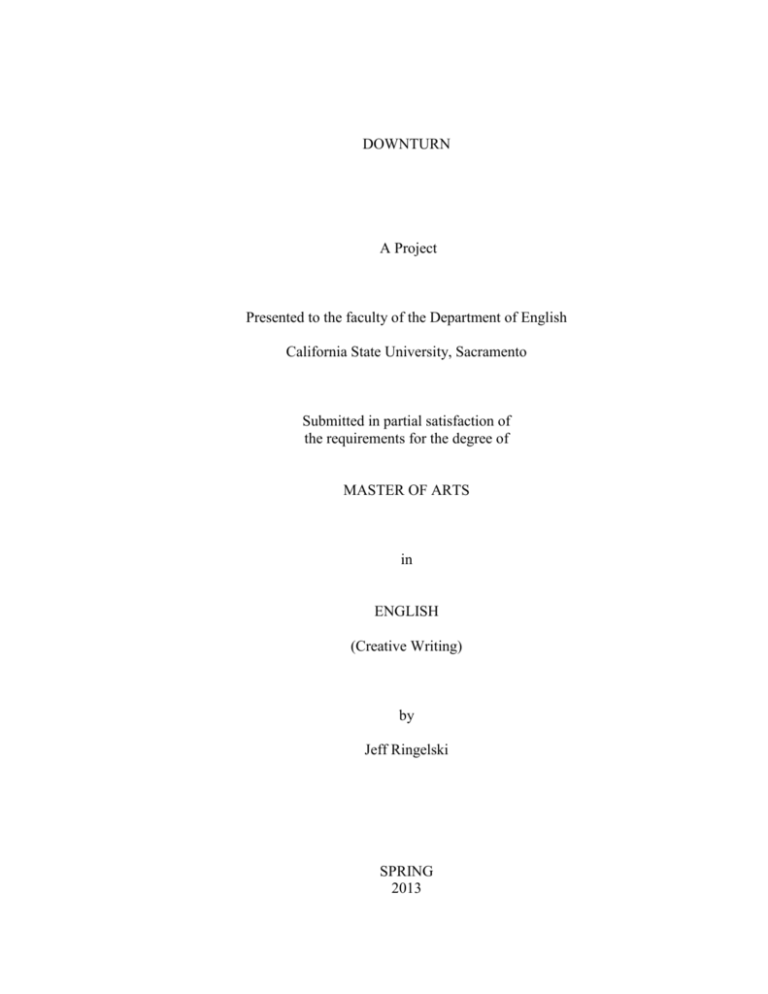
DOWNTURN
A Project
Presented to the faculty of the Department of English
California State University, Sacramento
Submitted in partial satisfaction of
the requirements for the degree of
MASTER OF ARTS
in
ENGLISH
(Creative Writing)
by
Jeff Ringelski
SPRING
2013
© 2013
Jeff Ringelski
ALL RIGHTS RESERVED
ii
DOWNTURN
A Project
by
Jeff Ringelski
Approved by:
____________________________________, Committee Chair
Joshua McKinney
____________________________________, Second Reader
Doug Rice
________________________________
Date
iii
Student: Jeff Ringelski
I certify that this student has met the requirements for format contained in the University
format manual, and that this project is suitable for shelving in the Library and credit is to
be awarded for this project.
_______________________________, Graduate Coordinator
David Toise
Department of English
iv
______________
Date
Abstract
of
DOWNTURN
by
Jeff Ringelski
This collection of poetry, written over the course of the last four years, gives my
impressions of contemporary society, the environment, the economy and, in some cases,
destruction and death. Despite the bleak nature of many of the poems, my intent is to
avoid despair in favor of an acceptance and understanding of misfortune; to acquire
knowledge from unfavorable experience, learning to navigate one’s way through modern
life.
________________________________, Committee Chair
Joshua McKinney
__________________
Date
v
DEDICATION
To Vicky, my wife, friend and excellent typist. Above all, you are an inspiration.
vi
ACKNOWLEDGEMENTS
I thank Professor Joshua McKinney for both his advice and for the allowance to make
the mistakes necessary to improve my writing. I thank Professors Jason Gieger, David
Madden, Doug Rice and Susan Wanlass for their insights and encouragement. And
finally, I thank Professor David Toise for his assistance.
vii
TABLE OF CONTENTS
Page
Dedication …………………………………………………………………………….
vi
Acknowledgements …………………………………………………………………… vii
Coal-fired……………………………………………………………………………….
1
Rest Stop Immigration Scene: Ehrenberg, Arizona…………………………………….
2
Reconditioned…………………………………………………………………………..
3
The Trail………………………………………………………………………………..
4
Ingenuity……………………………………………………………………………….
6
Epithalamion: Fifteen Years After the Fact ……………………………………………
7
A Miscarriage…………………………………………………………………………...
8
A Daughter Tidies up after Her Father’s Death………………………………………… 9
Happy Accident……………………………………………………………………….... 10
To My Father………………………………………………………………………….. 11
What the Wizard of Oz Taught Me……………………………………………………. 12
The Latest Old Rage…………………………………………………………………… 13
Card Tricks: On Stacking the Deck…………………………………………………...
14
After Sexton’s Transformations: The Dream of the Yellow Snake………………….. 15
Respiration…………………………………………………………………………….. 18
viii
Driving West Along Highway 12 in the Morning…………………………………….. 19
Spring along Interstate 5, Stockton, CA………………………………………………. 20
Delta and Breeze………………………………………………………………………
21
Shades of White in the Delta………………………………………………………….. 22
After Cézanne: Shaped Nature in the Delta…………………………………………… 23
Loss of Habitat………………………………………………………………………… 24
Nike Missile Site, Marin Headlands…………………………………………………… 26
On Starry Night: The Couple at the Bottom of the Painting………………………….. 28
Notes after Listening to Lee Morgan’s “The Sidewinder”…………………………….. 30
Hand Me Downs………………………………………………………………………. 32
I Knew a Woman……………………………………………………………………… 33
Parking Lot Doxology…………………………………………………………………. 34
Adaptations……………………………………………………………………………. 35
Merced Downturn……………………………………………………………………..
36
A Lab Worker Speaks of Love………………………………………………………… 37
Meditation on Mathew 5:39…………………………………………………………… 39
If I Had a 3-D Printer………………………………………………………………….. 40
Turing’s Cryptography………………………………………………………………… 41
Jack Johnson on the Ropes……………………………………………………………. 42
Stages of Coincidence…………………………………………………………………
ix
43
Booming………………………………………………………………………………. 44
What Computers Can’t Do in the Classroom…………………………………………. 45
The Smog Check………………………………………………………………………
46
Garden Tending…………………………………………………………………….....
47
Food Stuff Ad…………………………………………………………………………. 49
AM Skip………………………………………………………………………………... 50
To My Neighbor Convicted of Child Abuse…………………………………………… 51
Talk: A Suicide Hotline Worker………………………………………………………. 52
On Hearing the News of a Soldier’s Death……………………………………………. 53
x
1
Coal-fired
And then there’s the reliance
on a slurry line,
a mineral tram,
bisecting Black Mesa,
crossing above the 140 highway,
feeding coal bricks
into rail cars
poised like red wheelbarrows
waiting for a push
through eroded front yards,
backboards and white chickens,
down the hill
to the plant in Page.
And smokestacks, glazed
with condensation,
above the rocky finger
coves of Lake Powell
that on a washed-out
sunny day dull into
the color and feel
of concrete under
sodium light,
tinting the city
night sky into orange.
2
Rest Stop Immigration Scene: Ehrenberg, Arizona
Sonoran passengers on Gallegos, the red line,
the Mexican Trailways, pile out, brush
their way into the annual gem show crowd, a field
full of them, expanding their stake
in parcels of hard-baked juniper brush.
And the Border Patrol agents at work in their field
drive a coupe, creep, and halt a line
of Mexicans in the parking lot; staked
to nation choosing, and to the asphalt, they field
the origin questions, the purpose questions, a line
designed for the giving up of names, stakeholders in little pots and the brushoff. A young, ungainly man from the bus makes his stake,
runs, then careens into cars and people, beeing a line
through the card tables heaped with gems. A fine brush
for the unset gems spins as he gains on the field.
Their hair lined with sweat, the agents and runner tumble in an open field.
They stake him to the ground with muscle and brush his wrists with cuffs.
3
Reconditioned
Salvadoran factory workers meet
at a Lodi truck stop every week day
to commute to an East Bay cement plant.
Crammed into a Buick Century Custom
with a benched back seat.
Gas fumes rise into the sedan
through cracks in the chassis’ seams.
Red electrical tape covers its
broken right taillight. They pass corn rows,
over low bridges illumined by headlights,
and scattered utility light poles
marking entry to fields, farmhouses, leveed backyards.
Five of them ride through pre-dawn darkness
amid semis and cars jockeying for small gain
on narrow, two-lane rural highways:
the 4, the 12, the 160. All of them
split from the regular pounding, the heft
of wheels, heat and erosion. Road-crossing
and following reinforced rivers’ curves.
They drive to work jacketed
in the winter, sleeveless in summer,
sharing cigarette drags. On Fridays
shirt pockets stuffed with bills from employercashed checks, they dawdle, then report, to women
and babies, heirs who count spins on
merry-go-rounds and trips across sloughs.
Each lives in a house behind a house. Their
homes, places of rule and dance.
The workers sleep late on weekends,
black construction paper taped to windows.
They walk unshaven, coffee mugs in hands.
Lights dim in the house.
They sit still, imagine motion, on couches
watching the tv flicker,
definitions and colors whirring past them.
4
The Trail
I
The Michoacán cartel
plastered with dollars
went to Acapulco,
the pink cabanas,
the cliff divers,
blasted a threat to the teachers
of the city,
demanded protection money from them
and dropped off
severed human heads
on school grounds
when they refused.
II
Packers, mules, from Mexico
haul loads of pot
across the Tohono O’odham rez.
Lookouts on the hills above
signal divers to pick up
the new pot.
Drivers stuff into the trunk
the bundles covered with tarp,
roll though the dust,
past alkaline ground,
creosote bush,
to a storehouse in Casa Grande,
product to the buyers.
In the wake,
the packers with little rent money
wait for taxiing.
III
In a visiting room, Side A,
outdoor courtyard,
5
on the prison grounds
under a bench
next to a weeded garden
a balloon filled with dope
lies in the shade for pick-up.
6
Ingenuity
¡A lo cubano! Running the máquinas,
the yank tanks; the Packards, De Sotos,
marooned on the island. The Art Deco
flourishes: oversized, curved fenders. Tail fins
shaped like rockets from ‘50s sci-fi
motion pictures whose heroes oozed guile,
know-how to outsmart invading Martians.
Fixing a classic takes a black market
mechanic. Someone who trades out
a Lada diesel engine for an American
gas powered model, heirloomed. Hammer out
dents on heavy chrome bumpers in the calles.
Make them look new like before the embargo,
hoods gambled at La Nacional casino.
Now, shampoo becomes brake fluid.
Aluminum cans hub cabs.
Homemade brake pad recipe: asbestos,
soap cakes, talc sifted, cured overnight.
Molded together in a backyard shop.
Florida relatives visit, pack suitcases
filled with their American parts.
Along the malecón in Havana,
on the playa scene, ¡Ay mamita!
Car hoods open, mechanics bent in their trade.
7
Epithalamion: Fifteen Years After the Fact
The garden burst with bougainvillea,
orchids floated in bowls
placed on guests’ tables.
The bride, smoking her cigarettes, paced outside
the wrought-iron gate
that opened to the backyard;
stamped the butts into the cinder driveway.
And the groom inside the yard,
a single greeter
of relatives, friends, all late-comers—
held back by the traffic jam
on the main road into town—
drank fizzy water,
chatted everyone up
until most cars got through;
the bride, as if late for an appointment, pulled
her father along the aisle
until each other,
the bride and groom prepared for themselves
a table on which they set differences
combined with clumsiness.
8
A Miscarriage
On a diesel boat she retched
as the whales breeched
water, exhaling their mist.
We thought morning or sea sickness
kept her inside bending over a bucket.
The whales plunged against the waves,
foaming the water
and bobbing the boat.
Her dark face showed
no counting on life.
Bathrooms are always the loci of blood
drips, speckling the water and tile; a slog
for us to wade through.
She yelped the guttural strains of night’s
coming and taking, pushed against the white
porcelain, heaving too soon a first,
a growth, clotted, bilious, sheeny; what she called “that thing”
placed in a jar, wrapped in plastic for the clinic
but given to whittle parents.
9
A Daughter Tidies Up after Her Father’s Death
In my dad’s room, sales trip effects and motheaten threadbare clothes, stripped cedar. A stream
of termite tubes in the walls. Men build them –sets in a girlhood feature; a gapped-tooth
smile in a photo carries genetic paths.
Braille-like, my hand traces the bare walls damp
from a seasonal squall. Raising the lamp
reveals a fine crack from floor to beam. Both
could hold more dust, staple of time and house.
Upstairs in my room I once rose
to see Pacaya’s ashes fall like snow.
The city stopped. Ashes all piled over there
on the patio my mom swept with care.
Her husband out, she jobbed cleaning below.
10
Happy Accident
We, with our vows and family
stories, tend to ravel like DNA
or glance with friction like batted ball.
Exposed to air and light,
our uneven growth,
beyond our ken to distill
it for mass appeal.
We spoke of novenas on humid days.
Touching the rosary protects the weak, you said.
Our mixed cultures (village children
rollicking on the ground,
machetes an important field tool;
presumption of innocence)
come to truce come to glimpse
of self. Not the catching
look in the mirror, more
the study of lines
from pages in a book.
We rehearsed novenas on dry days.
Touching the rosary guides the lost, you said.
The bedroom door ajar
faint light enters our place of devotion.
I watch the twitch of your eyelids during sleep,
and imagine the forms, en vivo,
that animate your slow breath.
Leaning in, I kiss your forehead,
returning an allowance, and feel
nourished as if given water from a font.
We pray novenas by votive light.
Touching the rosary sheds doubt, you said.
for Vicky
11
from The Unsent Letters
To My Father
At ten, I used to trace an orange-red glow,
of your cigarettes,
a little full moon of embers,
from the lips to mid-torso
that brightened and faded
with the drags you took.
Was it a cracking heat vent
or a foundation settling that woke me?
You again sitting on the couch
in utter darkness
with exhaled smoke.
Crouching in the hall, quieting my breath
I watched the raising
and lowering of the cigarette,
as if it were a lit wand,
suspended in air,
heard your lips envelop
the filter end of it,
smelled the stale, cold draft
tasted the tight dryness in my mouth.
Your profile once turned, it seemed, in my direction.
I waited for a beck
or a curse
but no words flew from you.
I kept low
and retreated to bed.
I looked up
at the ceiling, curious
about the nearness
of titles, father, son,
and believing in the distance
of the moon and planets.
12
What the Wizard of Oz Taught Me
On the roadside attraction
Let’s pay no attention to the man
in front of the curtain. He barks
trinkets, keepsakes for the heedless.
If home were no place
then we would never miss it.
We’d look for the . . . Nebraskas
(any pretties there?); or farther away,
no twisters to tear
the whole feed lot to gray,
the move to black and white
states, and then lifting a latch
one morning into technicolor.
Gold brick, hot white poppies, steaming
green cities enough to make you melt.
When you see the man
behind the curtain,
watch where he blows smoke;
what a world.
for my daughter
13
The Latest Old Rage
A winsome, skinny-legged girl,
looking down, on campus,
stamps her heels, breathes out;
fingers do-si-doing through text
(her mother square danced in high school)
messages on a smart phone glowing
upon her face signals and pickups.
Losing her balance, she slips,
wrinkles herself and stands up,
roams among ready boys
eager to prove their currency.
Her mother twists a necklace, back and forth,
at home with hands that once prayed
on rosary beads in front of Mary.
She conjures images of the mother
chain, of women leaving fine stores to daughters.
She tells her husband how a boy
tangles their daughter in the way
youth charges to give away all
reserves, not thinking of the coming depletion.
The father stammers resistance to increasing
networks of teenaged friends
exchanging their selves for fitful company.
He curls up to his wife on the couch,
neck and shoulders full of stabbing pain.
His seething releases in spurts,
registers like hard, uneven steps.
14
Card Tricks: On Stacking the Deck
Ask a friend to pick a card.
He shows a two of clubs.
Back in the deck, shuffle
until the pack disappears
into card-trick limbo.
Feign frustration when the suits
resist command to reappear
in your palm. Sunday night
knock on the friend’s back door.
Fan the deck like a peacock’s
tail, displaying shiny, vinylcoated queens and jacks in spades,
stopping at the nine of diamonds.
He tsk-tsks the technique,
closes the door, heads
off to the king-sized bed.
At breakfast next morning,
the friend’s slice
of bread toasts
into a golden two of clubs.
15
After Sexton’s Transformations: The Dream of The Yellow Snake
I
One morning
my dog spoke to me.
His head at the foot of my bed.
Toss me a chew bone, Jeff
or this gluttony of mine will
take aim at any cat.
The parakeet blathering for
a cupful of seeds and cuttlebone.
The box turtle, stuck in the terrarium,
whispered for extra bits of lettuce.
His words floated up to me,
like little bubbles in a champagne glass.
Through his fricative voice:
intimations of husbandry, of sustenance.
II
Before my daughter exited the womb,
her head on a swivel,
my great-grandfather, apprenticed shoemaker,
ate pork chops every night.
Until once he brought home
in a cloth bag
a yellow snake for dinner.
The cries from his brothers
and shrinking parents
bothered him not at all.
The cooked serpent
with the snap
and give of
a sausage casing
bestowed unanticipated power.
He heard languages of animals,
soothed their fears,
explained people’s misdeeds,
16
a St. Francis in Ft. Wayne.
Then an interstitial quiet
left him fully splayed, raw
because now he was an elect,
a kindred interpreter.
Distressed animals found him.
There was a pig saved from slaughter
and a rabbit sprung from a snare.
Both of them, their skins at stake,
made bargains of the condemned.
Soon a local young woman, ready for marriage,
announced through the papers
a plea for a suitor of great talent
who could train intractable farm animals.
Dozens of men lost limbs and even life
trying to squeeze milk from dry udders,
pulling kicking mules through stony fields.
Finally, my great-grandfather charmed the Holsteins
and milk overflowed the pails.
The pig remembered him convincing the
other animals to line up like infantry
to help complete chores.
The rabbit remembered him too and
told all the small rodents. They cut hay and
split wood, working like paramedics.
The woman, smiling like a thief,
feigned boredom. She asked for more
and directed him to find the sweetest silver pear.
He went into the forest
but found no such fruit.
He tried every jeweler hoping
by force of alchemy one might infuse
metal with fruit flesh.
Again, no whiff of luck.
Then, he ran into the ever grateful pig who
showed him a single pear tree growing
in sand full of ripe silver pears.
Just like digging for truffles.
After several months, he returned to
17
the young woman.
Presenting her with a plump pear,
he bowed like a servant as
she bit past the taut skin,
into the meat of the fruit.
Progeny come from food like this.
They lay entwined like the snakes
on a caduceus staff:
he as confident as a rich man
and she expressive as a sigh.
Two of them living in a Craftsman house
without end.
Gorging on wedding cake every day,
their noses pressed against
picture windows—
sights for the neighbors,
sights for the graves.
18
Respiration
In our pursuit of happy life,
in the collection of old newness,
the air above and between
lifts and caresses us, fills us
mutually with the air-- no spheres-only a now and future air.
We aspired as kids
to fill up a jar
with fireflies, holes poked
in the lid. We ran with it
to the front porch
soaked by a summer downpour,
smelling grass, diesel and manure.
We carried no clock sense
but only the coming of dark.
Our breaths fogging
the glass, filling the jar
with what we thought was more air.
A summer cookout:
Charcoal flames
and heat waves;
lighter fluid burning up into
wisps of smoke,
gaseous bubbles
rose in the pop we drank,
and sparklers we lit turned
the one night sky into many, brief colors.
We ate the thick slabs of grilled beef,
bit into bread.
Our dad fanned the aroma
into the neighbors’ yards.
Our guts, our breaths
produced and received the molecules
going into the big blackness
that covered us all.
19
Driving West Along Highway 12 in the Morning
New asphalt poured over the old.
Every passing car and semi flattens the outsides
of the lanes,
raising the middle,
cresting it. Rainwater runs down
the black slant of the road,
seeping into rips,
filling up cavities,
expanding and cracking it.
Wind turbines, half-covered in fog,
stand a couple of city blocks high.
Their blades describe circles
pushed by bay winds.
Under them puddles pock-mark
the loam;
further down below
the ground fills
with water from the bottom up.
Right before a drawbridge,
a late driver in a sedan
goes over thin highway dividers
with yellow reflective strips on top;
goes through the low clouds,
plants into the muck
of a ditch;
sticking partly up,
and several chunks of it
scattered next to a levee
built to keep the overflow out.
20
Spring along Interstate 5, Stockton, CA
Early Morning
A layer of pollen
rests on the hoods
of vehicles parked in lots.
RVs line up at acute
angles to the company
gates. Truck yards
in which cargo-filled
semis burn diesel fuel
carried up and out by the delta
breeze. Tractors on display
in thick shades of green, gold
and orange. Commuters speed along
as they did in the days,
weeks and months before
on the raised, buttressed
curving tracks given
over to the daily
pounding of rubber, water and heat.
Night
Brighter than dawn
tungsten-halogen lights,
powered by gas generators
aim at the lanes, the median,
and the shoulder where Cal Trans workers,
fitted in miner’s helmets casting light beams,
portion and lift out large sections
of road with jackhammers,
creating heat, and fine white dust
floats and hangs like tule fog
above the slough, cutting under
the highway, meandering
and draining westward.
21
Delta and Breeze
Windows open at night, through the screens
she hears leaves rustle like gourds.
She works with attention.
Dish soap foaming on her yellow gloves
drips down the drain,
leads to sewers.
Files, reports and finally mailings:
arsenic-laced groundwater in her hometown.
She pours tap water through hard
plastic filters catching impurities,
like rain percolating into aquifers.
A skunk family crawls out
through an irrigation pipe—
connector, yard to field. A child
on a short June night mistakes them for cats,
from a distance, in the cooling dusk.
The mulberry’s shade stretches across
the neighbor’s yard, summer leaves
blotting the sun’s drop.
The woman plucks shoots
from her potted plants,
her lassitude setting in.
Half-raised blinds swing
gently at one end, then another
flimsy click. The nightly chiming.
22
Shades of White in the Delta
Tule fog hangs over the fields.
Rain clouds pile on each other.
Field workers, under canopies, eat their meals.
As before, smelters turned coke to steel,
Newly hoarse immigrants work with bother.
Tule fog hangs over the fields.
Big clouds of steam rise a great deal,
blown out by A-1 Cement, building fodder.
Field workers, wearing a light coat of gray, eat meals.
Adobe church full of the sick, the half-healed,
open regular times for the divided, the brothers.
Tule fog hangs over the fields.
A woman carries herself and creel,
dresses in factory white, walks the steps of a plodder
towards home where children eat their meals.
Tall, pale wind turbines spin, common wheels,
red-lit, vision for the unbothered.
Tule fog hangs over the fields.
Field workers, at work and home, take their meals.
23
After Cézanne: Shaped Nature in the Delta
I
From the ground a Great Egret,
white wedge of hollow bones and
pinioned feathers,
separates a plane of air,
lift and drag from currents, long black legs hanging
like canes. Widening circles lap
against reeds in the marsh, mark its leaving.
II
Bird watchers with binoculars see the
Great Egret as one made of two.
With its yellow eyes moving
an egret peers into
thick mud pilings for food.
III
The egret minces steps in a vineyard;
long rows stitched of trellised vines,
ripe with pendulous grapes
almost pulling leaves down to small mud holes
carved by sharp rain.
IV
A highway cop, to avoid traffic, stands among
wild mustard and radishes, writing a ticket.
The egret dips its yellow pencil beak, foregrounding
a striated sky, gray, pink and purple right
before the night.
24
Loss of Habitat
Haze falls from the belly
of a crop duster on an early fall
morning, coating juvenile corn
stalks in fields,
bigger than city parking lots.
The queen flies away to die, perhaps;
the bee colony collapses, reaching
the limit of biological stress.
Reduced range. Summering hives
in Montana and the Dakotas
cleared for more cattle, sheep grazing.
Corn and soy futures shooting upward.
A local keeper buys more queens
for orchard pollination in the spring.
Two weeks later, they all die
or vanish, leaving him insolvent.
He closes up shop.
Another beekeeper in Ripon says
it’s the hotter weather year round,
or parasitic mites in hives,
leaving a faded carpet, tiny orange
and black carcasses around his operation.
Heaving shoulders, he thinks systemic
failure: chemicals saturate food source,
drones, queen, her eggs dying.
Like the DDT in fish fed into
eagles’ bodies. Thin eggs crushed
by brooding parents.
Cindy, my niece, wears sundresses,
plays in the front yard, wants to catch
a bee to feel its bristle hairs. Have a
private honey supply. Low in the pantry,
I find one of those plastic, bear-shaped,
honey bottles, a bee image on top.
Her mother one day just left a note
25
at home, before walking away from it, saying
it’s time to find new life.
26
Nike Missile Site, Marin Headlands
We pitch on unimproved grounds. Our yellow
tent looking like a semaphore,
from air or sea, buffeted by gusts.
On the bay side I see the Golden Gate,
exceeding orange. The Bay Bridge retrofit.
City mounds, atomized groups. In-fill.
Portolá, with another vantage, coming
from the west was lost looking for
Monterey Bay. He spotted the one before me,
dreaming like a real estate developer:
Armada shelter, galleons without end.
The encomienda, counting doubloons.
We are down the hill from Ft. Barry,
abandoned, open for tours. An elevator
drops down to the bunker, stage for missiles.
Units of men assigned to control
booths of direct contact with other sites,
a circuit ringing the peninsula,
up to the Great Plains, over to D.C.
At the hostel down the road we bathe
in communal showers, prepare breakfast
in the barrack-styled kitchen.
Eating on the veranda, facing a gravel road.
Pentagon officials sent off
a press release, calling the place
a battery, not a missile site.
Foghorns resound at night,
their blare, and spotlights,
27
bring container ships to dock.
Ton-laden metal bins hoisted up
in the air to piers, to waiting trucks.
Victoria looks at reminders,
the era posted on chain link fence:
Restricted space. Keep away.
We travel through rebuilt blocks
of the past, braking ourselves of late.
The friction, the dismantle repurposed.
28
On Starry Night: The Couple at the Bottom of the Painting
Thick drops of yellow paints, almost like bulbs, pile
on the canvas, seemingly placed by fingertips
and the broad, choppy strokes make indelible lines
into which more than a scrap
of energy fed a fevered state
of mind, battling convenient ease.
The couple at the bottom stand at ease,
dressed in coarse fabric, woolen piles.
On such a night their state
in Provence would find them on a land’s tip
jutting into the water, close to a scrap
of raised rock; or is it a wave?, part of a curved line.
These lovers, arms linked, must have begun a line
of children. Theirs was nothing like a life of ease.
Often they dined on scraps
And the laundry grew into a big pile.
They remembered the village, its lights reflected in the water. The tip
of the shore afforded them a quiet state.
The fishing boats, in their creaky state,
afforded the man a chance to throw out a line,
haul in a catch, hung from a barbed tip.
(The hardest job, in hindsight, provokes a smile of ease.)
Given a big enough net, the fish wriggled in a pile
while seagulls dived for the scraps.
Over her shoulders a pretty scrap
of a shawl; no transcendent musing or state
for her. Just another daily pile
of chores, hanging clothes on a line.
She dreamed of that star- filled night, promising ease
when he had leaned in close, touching her with a nose’s tip.
Life itself offered weathless tips
29
as painting did for Van Gogh, placing them all in a scrap
of oil, muted greens, blues, an ease
full of dark, pitch dark, the beginning state.
Curving through the painting, three bands, lining
the sky, the water, the lights, emitting, reflecting energy piles.
A broken tip of a brush, a rag pile,
needful scraps that keep in line
a dreadful ease, a painter’s and lover’s acquired state.
30
Notes after Listening to Lee Morgan’s “The Sidewinder”
A kick-started blues on the bass roll.
A cakewalk fit for a bop, a chop,
a turn to the street folk, their flesh pushed hard
in bed pulled tight like drum skins. No stop
but for booze or dope as Morgan spent
fitful nights, body rigid as if in ties.
He placed himself, for lack, in a tie,
coiling around Helen’s body, a roll
of light brown song. They spent
themselves often. Her legs and butt chopped
the mattress in waves. His hands on her spine, stopped
like trumpet valves. Their parting an unsealing, rarely hard.
Shooting the horse made hard
marks on his skin; rubber tubes tied
off to push up sunken veins closer to a syringe stop.
The faceless, angelic high; sevens on a dice roll.
Greeted next by the bully who kicks people in the chops.
Nothing more than a long whine come to one C-note spent.
After detox lapses, the sessions spent
in rehearsal, the prime spot to gain hard
traction, to sharpen the musical chops.
The trumpet bell twisted upward, a tie
in brass (Gillespie showed him that). More rolls
for playing, the fleshy rolls of her, a place to stop.
Helen, in her way, wanted more than a stop
over. Remembered how she first saw him, coatless, money spent
on heroin. His good clothes in hock, she rolled
to the pawn shop, talked and bargained hard,
giving him her place to find his tie,
a cord to hold up under severe chops.
They groped each other, pawed blunt chops
31
to the torso. More from habit they couldn’t stop
pressing themselves on the other, lost or tied
to the exchange of self spent
to delay non-touch, no music in rooms, a hard
contract to break no matter how lucky they rolled.
Lee and Helen pulled each other hard, given to spend
after saving. Performing rolls in the air, like planes, but then the sudden chop,
her murder of him at Slug’s that brought ties to a stop.
32
Hand Me Downs
Gifted women dot Mars Hill
at sundown. They stretch, warm
their bodies and voices, before jogging.
Their glowing faces round instability.
A neighborhood patois comes
from their daughters whose chiseled
looks belie recent games of Red Rover. They laugh about
mothers uncoiled in Plymouths on the go.
To them, mothers avert plainness of the heart.
In back bedrooms under smudged growth charts
girls do rise to accept everyday breath.
Groomed and fit to a painful blur
daughters recite the makings of a her.
33
I Knew a Woman
who thought Mick Jagger was handsome.
She looked like beauty
cropped for an ad insert
in the Sunday paper,
clothes made in, top
to bottom, design for the sure
bet of a smile. With her hair
piled high like soft serve
ice cream, she used to bike
paths in town, pedaling
legs described circles
between wheel’s circles; forward
degrees to my stoop in summer.
Jumbled dismount, kick stand
always gave way; open-necked
blouse drawl, her arms wide-extended
at her sides, saying, to me,
no embrace keeps her.
34
Parking Lot Doxology
On freshly-laid hot black top, so new
shoes leave behind light prints, she paced
feral strides as if reined.
Asked passersby for change
to buy lunch for her three kids.
Among bright, thick lines: the blues,
the yellows, the whites, people stared past her,
recited the okey-dokey, sorry but.
She sang on, intoning her fast pleas,
repeating her verse in the same order,
rejoining rejections with thank yous, okays.
A customer inside In ‘n’ Out
saw her through plate glass,
went to her, saw caked salt stains
on her face. There in Modesto, a duo.
Back in the burger place, her voice
swelled: beatings from her husband. Brooded
before fleeing to a motel, sizing
up nowhere but a shelter, a rescue
mission for women with children.
Grasping the white, steaming
logoed paper bags, she rolled
up their edges several times,
carried them under her arms.
Nearly humming praise, went back
to her waiting children, shuffled,
her feet staying within the crosswalk.
35
Adaptations
A co-worker showed up decked in a black
eye; a shiner, said through a hard
smile, that came from the blunt end of a mop,
cleaning house.
Shook her head no, anticipating
questions of home.
Like any interruption of nature
at work, her discolored face drew us in.
None of us believed that story.
At lunch she recounted events
in the manner of a teacher’s lesson.
Expressed her simple cause: If x,
slipping on a wet floor; mop in hand,
then effect y,
dowel end into the eye socket. Damn
it hurt.
Later, in the break room, she whispered
to a female supervisor of the blows
from her husband. How he pastored
a youth group, non-denominational
storefront church. Services on Friday nights
for out-of-the-way teens. His name, tattooed
on her arm, seemed a brand, marked her lack
of capital. She wanted to stay quiet, stay put.
On account of the kids; slim, steady checks.
She left work wearing sunglasses.
That evening, on the commute home,
nearing a spot on the highway where
once before, I had seen, in the right lane,
a Swainson’s hawk, its left wing crushed.
A car collision sending it
into a counterclockwise spin.
The right wing extended, flapped,
half-pushed off, describing endless circles.
36
Merced Downturn
First children, as if prepping a yard sale,
slid and kicked cardboard boxes
onto the chunked sod. Younger siblings,
a caravan, plunked down inflatable
rafts, empty coolers, wall hangings.
Their parents lifted and skidded furniture,
placed some on end, down the driveway; stacked more
boxes, flaps partly open, constructing,
to the kids, a city skyline in miniature.
The wife, the mother, capped by matted hair,
dived ceaselessly into the house,
returning to the truck with plots
of residency: picture frames, souvenir magnets.
She leaned into her husband, cheek to chest,
who himself leaned against a stucco wall.
Grasping her hips, he looked straight
down at her. They released each other,
a margin between them. Like a white
flag, a notice to vacate
taped to the front door.
37
A Lab Worker Speaks of Love
Unlike Fleming, who was on
vacation when stray mold
spores landed in and then gobbled
bacteria-loaded
petri dishes stacked in the sink
of his lab, my great
discovery came on the job.
(Vacations, sometimes, like the messy lab
bring out the best
in lethargy.) Her appearance
brought no moment of wonder.
Nothing compelled me to dash
into an adjoining room,
seize a colleague by his lapels
as if to reveal the trade secrets
that atomize any workplace.
What I felt was steady
unrelenting pleasure in her
performance on the job.
(She measured beakers with aplomb!)
Charted accurate results,
refused to fudge them
despite the clients’ incentives.
There is always a control
group to measure against
those who take treatment.
And in my trials,
finding the unaffected
gave me no easy solution
no more than those
who claimed the right,
the need to feel the symptoms
of perfumed evenings enveloped
by great celestial objects.
Or, for me, the sight of ungloved
hands and a mole
above her upper lip.
38
Sterilizing the test tubes
with Lysol, as I had
done before, brought me
at last, the insightful
moment that comes
from mindful habit
and its lucky residue.
What we call love
always hangs
in the air.
We attach ourselves
to it, a symbiosis
benefitting mutual hosts.
Less than full selves,
we move nearer
to more complete results.
39
Meditation on Matthew 5:39
Resist not the evil, the real estate scam
the come-on from the history book
of land messes; the preacher’s private lamb.
Grasp them all in the mind,
deadening the sense to strangle,
to choke back their lies, to each their own kind.
Offer a difficult, enduring embrace,
fumble away all certainty,
the desire to hammer them in place.
This is the narrowing of the self:
stripping away the impulse to rejoin,
to make instant topics a great wealth.
No falls into gullible places;
slow reworking toward childlike phases.
40
If I Had a 3-D Printer
It would make a layer cake
living up to the name.
Layer
by
thin
layer.
Without the messy complication,
top falling in
on the
bottom.
Or I’d program a template
for a belly button, an outie,
built up a good half inch
from my girdling stomach fat.
Respire through it during
meditation class, concentrating
oms. Take it out from under
my shirt. Showing the instructor
its laminate gloss, chakra of my dreaming.
I’d regret, at times, lack
of a matching umbilical cord,
blood flowing to a placenta,
lining an enlarged uterus,
rounded vessel.
Giving of nutrients,
immunity from the knocks.
A liquid nature, the lull prior
to expulsion. From submergence
to the outside, baptism in reverse.
Catching sight of the gleaming machines.
41
Turing’s Cryptography
An outlier broke the Enigma
code of the great war’s German navy.
He posted instructions, disguised
the data, doing with finite symbols
and digits the infinite work, life-saving.
He moved to paper strips of unrestricted length,
step by step guides turned his ACE to computing
success coming through force of will. Outward
appearance of math equations done well,
but the machine, like the mind,
a series of pulses, signaling relays
ceaselessly. No need to shut it down
until an admitted, random pick-up brought
the authorities’ attention. They tried
him, injected him with female hormones.
A clearly cut pervert, officials said,
was open to blackmail. The widespread net
took his security clearance. He died,
leaving a code: a bitten apple, cyanide.
42
Jack Johnson on the Ropes
Crowing violence in the ring, in the sun,
the custom of the day stopped mixed
relations, but for trade in value gambled
on a bout in Reno against Jeffries,
stopped in round fifteen. The news tapped on wired lines,
whipping around the trees, Jeffries’ white towel
relenting to Johnson’s horsehair-stuffed mitts.
Like the speeded-up newsreel film of the fight,
distorted events moved fast; a flurry
of details cornered by legal writ.
Charges to count: woman-taking across state
lines; this barrier, the White Slave Act
dished out punishment to Johnson. A fix
for mistresses fair-skinned, pinned to false claim.
Churning the mytho-fact, convict-cum-exile.
43
Stages of Coincidence
There is a photo,
taken by Jim Marshall,
during the Monterey Pop Festival,
of Jimi Marshall Hendrix
kneeling up on a platform,
backgrounded by Jim Marshall amps,
bottle of lighter
fluid in his hand,
held out at waist level,
a divining rod
pointing at the flaming guitar
trick of showman
relic of shaman
apparent sound death.
The medium of screaming muses
converted into fanfare
for the eyes.
44
Booming
1
Newton, master of the mint, put into
motion silver’s effaced exchange, made gold
standard. Yellow bars and coins became hedges.
2
Outbreak of discovery. Foothills run
through with sluices, wood terraces
separating silt from find.
3
People promised to notes, in a rush
to raise cash, sell watch bands, engagement
rings and tooth fillings to goldsmiths who smelt
them all to uniform troy weights.
4
Jobs chiseled away. Friction from selling
ever thinner slices of property deeds.
The complex: peened securities as if
filigree, twisted, bent upon themselves.
5
Flushed noteholders reconsider, breathe in
collapse, devalued fiat currency.
Improved by climbing gold prices,
they lose balance, like scales off-kilter.
45
What Computers Can’t Do in the Classroom
Stevens’ necessary angel, imagination,
stretches figures like infinite
helium-filled balloons
to unknown shapes and sizes
beyond immediate lucidity.
There and behind in half-blind
alleys creatures, more shadows
than meat, conjoin with graffiti walls
sprayed with fat words,
crossed-out symbols, marginalia
for the street-bound.
And my next-door welder forges
bridge spans —and stolen checks –
skills acquired during prison
time, when the ineluctable hangs
around the unsteady nerves.
Or consider the painter, template-less,
blinded by blank canvass,
bereft of code,
splashing a whore into the foreground
of an atom supercollider; or even a baker
whipping up spongy rolls,
warm, yeasty – without mold.
46
The Smog Check
After the blue smoke
billowed from the exhaust
pipe of the ‘87 Corolla
and the technician said
“You pass,”
he sent by computer
the results to the state
DMV which archived them,
sent them to police agencies;
me a dual citizen:
good luck payee,
tapper into low accounts.
47
Garden Tending
His widowed neighbor,
housecoat open at the bottom edge,
knelt to weed her yard
while my nephew
pulled hedge blooms
as he warmed up his bike
riding smaller concentric circles
on the fresh blacktop.
Before his friend, Stevie,
yelled “bullseye,”
and some time after he received
the old poster
of Evel Knievel, decked out
in white jumpsuit--wide collar, unbuttoned,
a white- starred, blue-striped “V”
across the front--hair flowing back
in great sections;
he pushed off from a plywood ramp
sturdied underneath
by liter soda bottles
filled with quick-dry cement,
duct-taped together,
aimed the fat front tire
at her marigold bed,
landed in wet mulch,
left a wide rut,
spun half-way around,
clipping from their vines
some heirloom tomatoes.
Raising from the seat,
arms extended upward
to his imagined throngs,
he lost balance,
fell backwards onto a sprinkler head.
48
Then the cuffing from his mother,
who collared him as if holding a sack of groceries,
training him across the grass
past the oil-stained driveway.
Inside their A- frame, she pushed him on the couch
twisting down on his shoulders
like digging to set up posts.
That night his father,
dragging on a cigarette,
blew oblong smoke rings,
and walked past the trellis;
explained to the widow
boys are not just boys,
not gifts, but graftings.
49
Food Stuff Ad
Better
than you
ever had before
or what your parents had as kids
when they forked from t. v. dinners,
its rolled aluminum lips, uneven heating,
burnt cherry cobbler, gelatin and cornstarch, bubbling over the side.
Chopped Salisbury steaks a uniform brown,
heat waves dewing their faces as they dug
in before the Friday night sitcoms’
running laugh tracks bust their guts.
You
can get
now, more often,
(no matter what grown-ups say)
a light, chewy wafer
based on trademarked corn,
test-baked in labs,
with a made-for-mouth thickness,
sweet bundle of low calories singly wrapped.
Discover mealtime replacement.
Because hunger moves well,
we sell its betterment.
50
AM SKIP
Play “Wipeout,” Eddie1! . . . and Eddie on his Pearl set sent rattles and brass crashes in
the band room over choir risers worn by teen ways of scuffling . . . A stiff start to a cold
day. Fixtures respond to flips of the switch. Rhythm teeters, enters. Body unfolds like a
pullout sofa bed. Increasing snaps of bone on bone. The knee hinges, the shoulder pivots
with a fine brittleness, worn down by daily bearing on the trunk, a torso yanked by
gravity. Radio, by signal, used to perform and put breath and layers into task and trouble .
. . Mixed chorus sings radio station jingle in the key of D. (Purportedly, this is same key
crowds at sporting events fall into as they cheer the home team and taunt the visitors):
One thirty-six, K-R-U-X. Richard Ruiz2 here on the big thirteen sixty, KRUX. I’ve got a
pair of tickets to Friday night’s concert for the 10th caller. Call now . . . And on the
screen the unread e-mail. Spam blocks the ease of the day. Photos on Facebook. The
expanding scrapbook to show my family, friends, the lost classmates, the practices and
treats of my half-lived adulthood on fault lines . . . Radio commercial time is straight up
2:00 o’clock: . . . But after using OXY 5, lotsa people don’t have zits, zits, z-z-z-zits.
Showing up at Lisa Logue’s3 house with the white cream spotted over my face. Her whitesleeved maroon t-shirt hung low enough to look like a mini-skirt. . . Around here soft
tissue balls up tightly; the home of scar formation. I touch the apps on the phone screen.
Order breakfast. No human face. No voice. Images and icons. Encoded transits through
wire and air in hard binaries. The signal is not always clear. . . X-ROCK 80 from Ciudad
Juarez/ El Paso beaming 100,000 watts of pure power into your neighborhood, down
your street and in . . . The earpieces connected to the transistor carried the blast from the
border. Spanish and English. Bullfights on Sundays. Top fuel dragsters on Sunday.
Always on Sunday. Services at the church with family. But the NHRA Winter Nationals
featured Garlits. Muldowney. They drove on feel, on carburetion. Accelerator pressed
flat for all 10 race seconds. . . Callin’ mercy. Ain’t no smilin’ faces lyin’ to the races. I’ll
take you there. The Staple Singers on KUPD, Cupid. That was the way to sixteen, a
mechanical tripping of lights brought the world to essence, to senses. Fuel, energy, and
speed all checked by needlepoint dials on the dash. A heady mixture of burnt tires, waves
of heat churned out by superheated cars. Gas fumes up in the air. Before accumulated
crash damage sent us home.
1 Eddie Matthews, the best drummer at Senita High School. He joined the military and was an advisor to the Mujahadeen in
Afghanistan during the 1980s.
2 Richard Ruiz, a disc jockey at KRUX, pronounced his last name Reese.
3 Lisa Logue looked very attractive in t-shirts. She became a club pro at a local golf course.
51
from The Unsent Letters
To My Neighbor Convicted of Child Abuse
At the slightest dip in your arms, lean, bare,
your child went in for clucking and cooing.
You, waitress at the Club, invited stare
after stare, spending much time juking.
All fixed up on heels and meth, driving straight
around the lasting touch, lifting a glass
to celebrate the teasing, plying fate.
Laughter in a wedding veil smacks of the fast
try to gain husband, father to the child,
who bouncing in the pen shook from lesser
kindness, passed out in degrees as if style;
a portrait or bronzed shoes on the dresser.
A diaper changer trades in wet, soiled flesh
and piercing noises that come with duress.
52
Talk: A Suicide Hotline Worker
Each night on the graveyard shift,
they call in anger, a lover fit
to be tied and bound to assumed vows.
Or money problems. Laid off. Medical bills.
Unable to reach payment solutions,
to save face, they seek reassurance
as from proper parenting or a god full of grace.
Most want to hear a timbre specific to place.
Of feats in a newspaper clipping,
a child’s question, letters from home.
Craving for tones by which to reclaim
lost sensation of pleasure— the English
widow who walked to the subway to hear
the recorded voice of her dead husband
announcing arrivals, departures. His
disembodied voice warming her.
Some take time to come to the point like the guy
who ran his company into Chapter 11,
faced foreclosure, had nowhere to go.
After three hours, he admitted to embezzlement,
philandering while his wife underwent
breast cancer surgery. He wanted
to kill himself right there with his loaded
shotgun. After five hours, he put down
the phone. I heard the sound of breaking glass.
He picked up again. Said he tossed his gun
through a kitchen window.
The voices in his head calm.
53
On Hearing the News of a Soldier’s Death
PFC Munch, 21 years old, stationed in Camp Pleasant,
married his girlfriend ( she was jumping-off-the-bed-happy)
two months before (they had thought
about putting it off)
an IED hidden
by an Iraqi
with split loyalties
blew him apart.
Now, therefore, his widow, Jill,
hushes her way
through his bag of effects.
Says he toured there twice before.
Says they honeymooned in the Black Forest
(the ceremony was a rush job)
on a weekend pass.
Says they were going to get degrees,
live in bounds and strides,
their days spent unsheathed,
ready for any offerings.

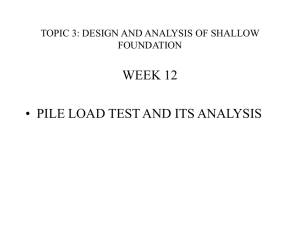
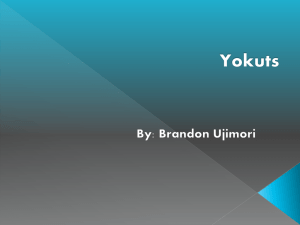
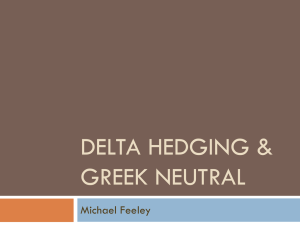
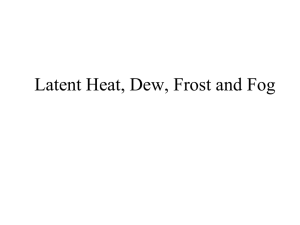
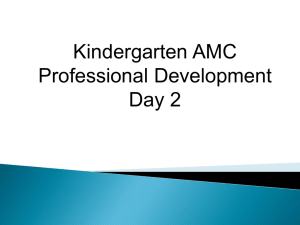



![Kwadijk-Deltatechnology presentation [Compatibiliteitsmodus]](http://s2.studylib.net/store/data/005765666_1-8750ea686d0c834b2bb5a5055d5c4a69-300x300.png)